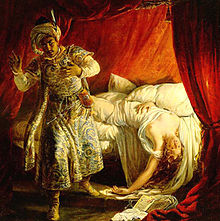Otello (Verdi)
| Otello | |
|---|---|
| Opera by Giuseppe Verdi | |

Otello and Desdemona
by Alexandre-Marie Colin, 1829 |
|
| Librettist | Arrigo Boito |
| Language | Italian |
| Based on |
Othello by Shakespeare |
| Premiere | 5 February 1887 Teatro alla Scala, Milan |
Otello (Italian pronunciation: [oˈtɛllo]) is an opera in four acts by Giuseppe Verdi to an Italian libretto by Arrigo Boito, based on Shakespeare's play Othello. It was Verdi's penultimate opera, and was first performed at the Teatro alla Scala, Milan, on 5 February 1887.
With the composer's reluctance to write anything new after the success of Aida in 1871 and his retreat into retirement, it took his Milan publisher Giulio Ricordi the next ten years, first to persuade him to write anything, then to encourage the revision of Verdi's 1857 Simon Boccanegra by introducing Boito as librettist, and finally to begin the arduous process of persuading and cajoling Verdi to see Boito's completed libretto for Otello in July/August 1881. However, the process of writing the first drafts of the libretto and the years of their revision, with Verdi all along not promising anything, dragged on, and it wasn't until 1884, five years after the first drafts of the libretto, that composition began, with most of the work finishing in late 1885. When it finally premiered in Milan on 5 February 1887, it proved to be a resounding success, and further stagings of Otello soon followed at leading theatres throughout Europe and America.
Verdi's early retirement
After the completion and premiere of his opera Aida in December 1871, Verdi decided that it was time for him to end his successful career as a composer of opera, much as Rossini had done after the completion of the opera William Tell, though he was easily the most popular, and possibly the wealthiest, composer in Italy at the time. However, Verdi's sixties were not good years: as musicologist Julian Budden notes, "he seemed to have entered [those years] in a mood of gloom and depression [..and..] his letters at the time were full of complaints about the Italian theatre, Italian politics and Italian music in general [all] seen by him as sinking beneath a tide of Germanism".
...
Wikipedia
